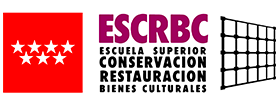Access VII
05/06/2025 2025-06-05 12:32Access VII
Student Access and Admission
Access Requirements
To enroll in the Master’s Degree in Artistic Education in Conservation and Restoration of Cultural Heritage in Europe, applicants must hold prior training in conservation and restoration (MECES Level 2 / EQF Level 6), accredited through one of the following qualifications:
An official Bachelor’s-level higher education degree, such as:
Bachelor’s Degree in Higher Artistic Education in Conservation and Restoration of Cultural Heritage.
Advanced Degree in Conservation and Restoration of Cultural Heritage.
Bachelor’s Degree in Conservation and Restoration.
An equivalent degree issued by a higher education institution within the European Higher Education Area (EHEA) that qualifies the holder to access Master’s level studies in the issuing country.
An equivalent qualification issued by a higher education institution outside the EHEA, without requiring official recognition, provided that the competent educational authority verifies that it certifies a level of education equivalent to the aforementioned degrees. Access through this route does not imply, under any circumstances, official recognition of the prior qualification nor any effect other than eligibility for admission to this Master’s program.
Other higher education qualifications, including:
Degree in Conservation and Restoration of Cultural Heritage (equivalent to a university diploma).
Licentiate Degree in Fine Arts with a specialization or track in conservation and restoration.
Language skills will be considered, as they are essential for student mobility and participation in international internships.
Some subjects may require prior knowledge in specific fields or specialties.
Admission Process
To apply for the Master’s, candidates must complete the pre-registration form (available on the ESCRBC website or from the ESCRBC Academic Office) and submit it along with the following mandatory documentation:
A copy of a valid identification document (ID card, passport, NIE, or equivalent).
A CV including academic qualifications (GPA, degrees, courses, or related training), relevant experience, and language skills.
An official degree certificate or proof of having requested it.
An academic transcript detailing the subjects taken, corresponding credits (or hours), and grades obtained.
Proof of other qualifications or achievements (language certificates, other degrees, courses, professional experience, etc.).
A motivation letter written by the applicant, explaining the academic, professional, or personal reasons for applying. It must include contact details (email and phone) for possible interview.
Applicants from non-Spanish-speaking countries must provide proof of Spanish language proficiency.
The completed form and all required documents must be saved as a single PDF and compressed into one ZIP or RAR file, then sent to master@escrbc.com.
In addition to the required documents, the Academic Committee may request additional specific materials. These may be submitted digitally or delivered in person to the Academic Office within the established deadlines.
Prior to final enrollment, the original documents will be requested for verification.
Important Dates (7th Edition, 2023–24)
Pre-registration period extended until January 30, 2023.
Applicant interviews: December 13, 2022.
Enrollment period: January 9–13, 2023 (from 10:00 to 13:30).
Admission Criteria and Candidate Profile
This Master’s Degree is intended for graduates in conservation and restoration (MECES Level 2 / EQF Level 6) who wish to enhance their competencies through advanced and multidisciplinary training. The program encourages initiation into research activities and aims to integrate graduates into the professional field of conservation-restoration, particularly in a European context.
The program builds upon the curriculum of the Advanced Degree in Conservation and Restoration of Cultural Heritage delivered at ESCRBC (Decree 33/2011). Therefore, an equivalent level of prior training is required. This ensures that students can benefit from the program and that graduates meet the qualification standards for professional practice in relevant countries.
To ensure that students’ prior education aligns with international standards for conservation-restoration professionals at the Master’s level, their background must correspond with the basic content established by the Spanish Ministry of Education for undergraduate studies in Conservation and Restoration of Cultural Heritage (Royal Decree 635/2010). If not, supplementary training may be required.
Particularly important areas of prior knowledge include:
Professional management and organization
Conservation-restoration project development
Research and documentation methodology
These subjects are further developed in the Master’s program.
A minimum B2 level of language proficiency is recommended to support student mobility and eligibility for international internships.
| Weighting | |
| Alignment of the applicant’s previous studies with the program’s entry profile | 50% | |
| Language proficiency | 20% | |
| Academic achievements: academic transcript of relevant studies, additional degrees or related training | 10% | |
| Experience related to the program content | 10% | |
| Motivation, evaluated through a personal interview and motivation letter | 10% |
Certain subjects may require prior knowledge in specific areas.
In the event of a tie, priority will be given based on the order of pre-registration.
